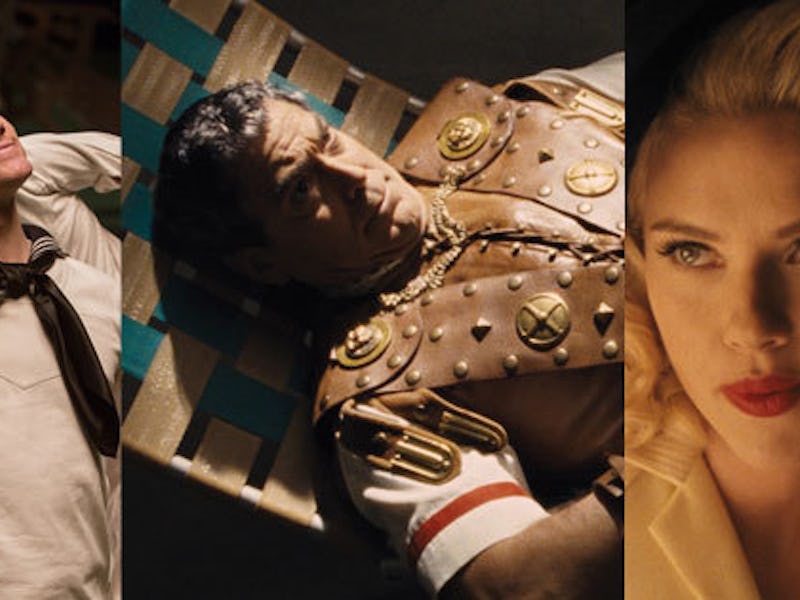With ‘Hail, Caesar!’ the Coen Brothers Make Their 1950's 'Inherent Vice'
The ensemble comedy -- starrring George Clooney, Josh Brolin, Scarlett Johansson and Channing Tatum -- is some kind of batshit masterpiece.

Hail, Caesar! is one of those Coen Brothers films that they made because they can. It screams “labor of love.” The writing and directing team consistently turns out banner movies that are both widely acclaimed and lucrative (No Country for Old Men), great movies that not everyone thinks are great but many love (Inside Llewyn Davis, Burn After Reading), and then movies that they probably think are great, but through a lens that it’s not easy for anyone else to isolate (Intolerable Cruelty, The Man Who Wasn’t There).
All of their films — no matter how little of a benefit of the doubt you give them, and how much they really seem to have made them for themselves — have some truly unforgettable sequences. Even, say, dark screwball comedy Intolerable Cruelty, one of their least popular films, has moments of farcical genius, for all of Catherine Zeta-Jones’ emotional flatlines and punchlines that don’t distinguish themselves as such. But it has Carter Burwell’s hilarious invasive soundtrack over the Baron and hotel concierge petting his dog, Clooney prancing around, dramatically interrogating him, and Geoffrey Rush with a ponytail, screaming along with nearly the entirety of “The Boxer.”
Their latest, Hail, Caesar! — touted as a spiritual sequel to Cruelty, as well as O Brother, Where Art Thou? — will not work for everyone. It’s hard for a piece of art to do that — to look cohesive and congruous from any angle — when it packs so many mini-love letters to other pieces of art inside of itself. The dalliances can be distracting, and the Coens love references and subtexts. Hail, Caesar! focuses around a motion picture studio in the very early ’50s, and much of the film is devoted to clips of movies embedded within it. The Coens cut quickly between different sound stages and dailies screenings. We find, among others, Scarlett Johansson as a Busby Berkeley-style starlet, Ralph Fiennes as the British director of a dry and refined comedy-of-manners, Channing Tatum as a tap-dancing Gene Kelly/Fred Astaire mock-up, and Alden Ehrenreich as a not-as-dumb-as-he-seems acrobatic cowboy action star.
There are also, more bizarrely, figurative movies-within-movies — that is, drastic changes of style and genre within the Coens’ script, mostly between comedy and more tense noir. The Coens clearly took enormous pleasure in recreating and lovingly parodying microgenres from that period in film, especially the biblical epic that shares the film’s name, “A Tale of the Christ.”
And so more than anything the Coens have ever done, Hail, Caesar! is a movie about movies, while many of their films pay tribute to older styles of Hollywood film (Miller’s Crossing, The Man Who Wasn’t There, etc.) But there are other macro through lines that give the film more heft. The movie industry is booming in the time period in which the film is set. At the heart of the current, prosperous machinery are cogs like Eddie Mannix, played with typical charm and perfect comic timing by Josh Brolin. Mannix is postulated in inflated voiceover as an enterprising hero — shades of Sam Elliott’s narration in The Big Lebowski. In reality, though, he’s a guy whose biggest professional concern is schmoozing and “drying out” drunk actors. Outside of that, he labors in confessional about trying to keep away from cigarettes. Mannix’s Catholic guilt and work ethic is played as buffoonish. Mannix is clinging to a sinking ship, a clownish martyr who works himself to the bone because he feels, for some obscure reason, as if he deserves it.
In the background of, or parallel to, all the action in the Coens’ film runs a feeling of paranoia — some specter of impending doom, or gaping, unknowable unknown. Here, it’s a special kind — for a time period that’s portrayed very often in films. Mannix and the ensemble are faced with the first threats of the future (literally, the Communist collective “The Future,” as well) of the rest of the ’50s, in which culture is set to be more homogenized and streamlined. The advent of the home television set is postulated as a threat to the livelihood of films, and they are just beginning to be in every home; the H-bomb has be tested in secret, as Mannix is told by an executive who hope to lure him away from the film business to Lockheed. “Cold War paranoia” is only just beginning: World annihilation is not a possibility over which the (populus*, and Hollywood film by proxy, are obsessing yet. Communists are goofy, bumbling and disorganized, rather than threatening. Their figureheads still write dreck or tap dance for the industry, a system of capitalistic greed to them. Subversion is still in its infancy and maybe a pipe dream. It’s an evocative, sometimes surreal world — inspired and fleshed out.
One wishes only that the film would work more on the surface level, without having to rely on the odd structuring, religious and philosophical in-jokes and references — fun for Coen Brothers devotees to unpack, but not necessarily noteworthy for the general audience. There are plenty of great lines, pointing toward the screwball, character-actor-driven humor of comedy directors of the time in which the film takes place — Preston Sturges and Billy Wilder, in particular. But it’s light on belly laughs.
The most immediate appeal is in the nearly scene-to-scene genre-bending, and the breakneck, entropic energy the script builds up. It channels a bit of the winding, dizzying quality of Paul Thomas Anderson’s recent Inherent Vice, but realized in a wry, restrained way befitting a film set during one of the squarest time periods in our country’s history. Ultimately, Hail, Caesar! is a flawed and patchy movie, but a great one. In a way, it’s fitting, recalling the studio-doctored ambition of many of the films of the time period it is romanticizing.